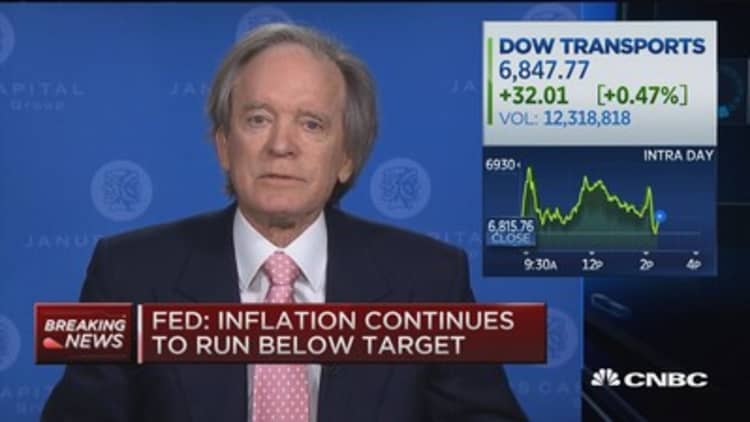
Low interest rates and massive levels of central bank intervention have failed to generate strong economic growth and are beginning to endanger investors, bond guru Bill Gross said in his latest analysis.
Around the world, high debt levels combined with slow economic growth and tumbling oil prices are providing obstacles that extreme easing has been unable to cure, he said.
In the U.S., Gross said even the Federal Reserve is unsure that risks to its optimistic outlook are "balanced," generating "shades of 2007" in terms of what the headwinds are for growth.
In sum, the problems challenge the assumption of central bankers like Janet Yellen in the U.S. and Mario Draghi in Europe that low interest rates are a cure for whatever ails the global economy.
Read MoreThe Fed is losing its benchmark: Gross
"They all seem to believe that there is an interest rate SO LOW that resultant financial market wealth will ultimately spill over into the real economy. ... How successful have they been so far?" he wrote. "Why after several decades of 0 percent rates has the Japanese economy failed to respond? Why has the U.S. only averaged 2 percent real growth since the end of the Great Recession?"
His comments come as monetary authorities around the world ponder tightening financial conditions despite loose monetary policy.
In the U.S., the Federal Open Market Committee hiked rates in December for the first time in nine years, then followed with a post-meeting statement in January that equivocated on its economic assessment. Importantly, the Fed removed the word "balanced" to describe risks to its outlook.
Read More Banks have more bad news for the economy
Futures markets have reacted, indicating that the Fed's cautious but progressive course for rate-hiking likely would be deterred by tightening financial conditions. Traders on Wednesday were pricing in no chance for a rate hike in 2016 and only a 31 percent probability for a move as far out as February 2017, according to the CME's FedWatch tracker.
Gross, who runs the $1.3 billion Janus Global Unconstrained Bond fund and founded bond giant Pimco more than 40 years ago, said debt problems are coming into clearer focus for the U.S.
"The household sector has delevered, but the corporate sector never did, and with investment grade and high yield yields 200-1,000 basis points higher now, what does that say about future rollover, corporate profits and solvency in many commodity-sensitive areas?" he asked.
Indeed, ratings agency Moody's has issued two warnings this week about deteriorating conditions in the corporate bond market.
Read More Trouble ahead: Why 2016 keeps getting uglier
The number of corporate issuers in the distressed category rose 6 percent from December to 264, which is just 27 away from its credit crisis peak, Moody's said Wednesday. The total has grown 44 percent from a year ago, pressured mainly from energy companies.
However, Moody's said the energy contagion is beginning to spread, with more than half its downgrades coming outside the sector. Its Liquidity Stress Index jumped to 7.9 percent in January, the highest level since December 2009 and the biggest single-month gain since March 2009. The index's long-term average is 6.7 percent, with the all-time high of 20.8 percent hit in March 2009. Moody's said a reading above 10 percent with 40 percent of the 21 sectors above that level "would be more worrisome for the default rate."
The agency expects the spec-grade corporate default rate to hit 4.4 percent in 2016.
Gross warned investors to focus on safety.
"What I do know is that our finance-based global economy is transitioning due to the impotence of monetary policy which has always, and is now increasingly focused on the elixir of low/negative interest rates," he said. "Don't go near high-risk markets, stay safe and plain vanilla. It's not predetermined or guaranteed, but a more prosperous outcome should be somewhere around the corner if you do."






